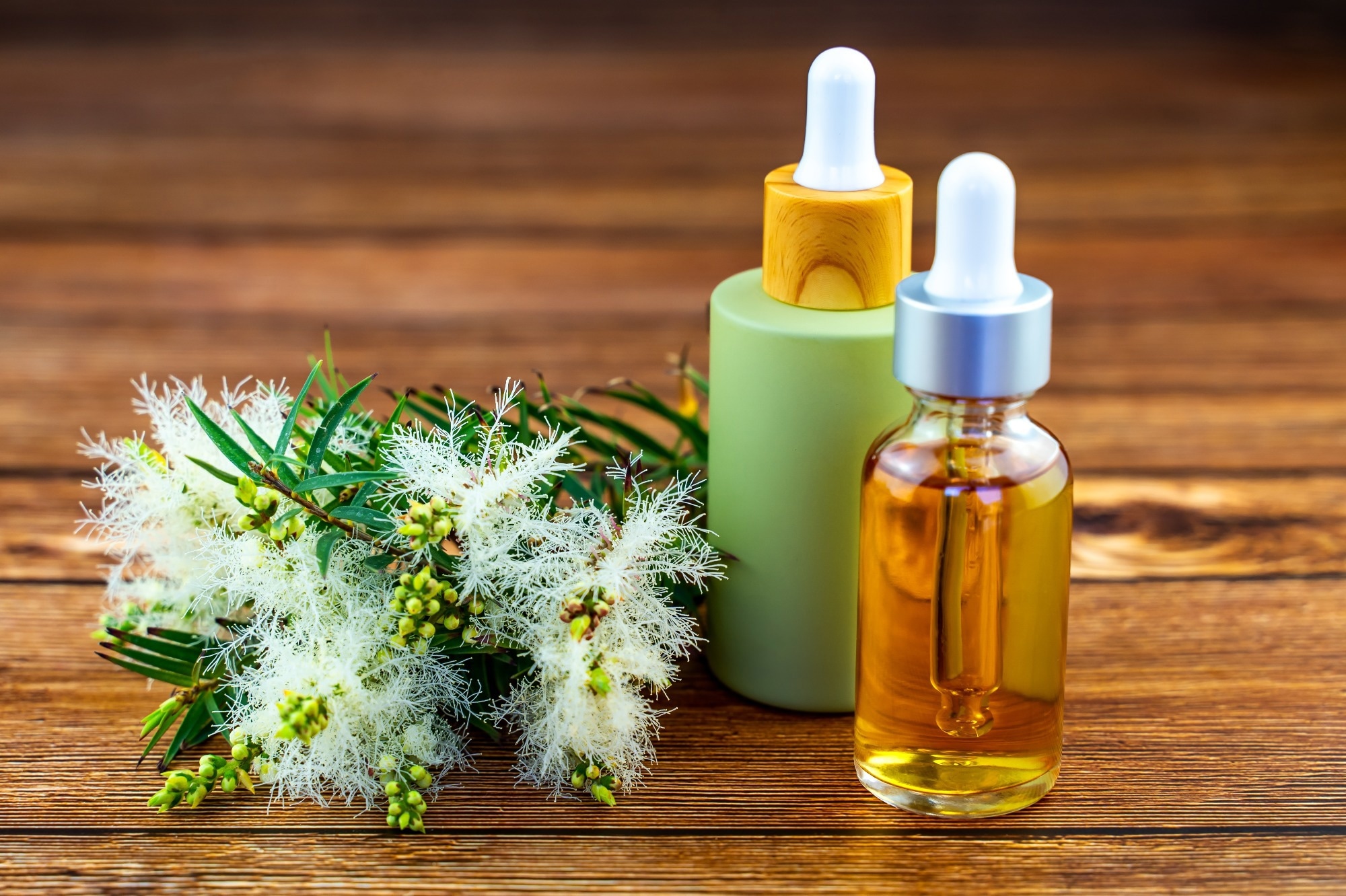Acne vulgaris is a distressing condition that primarily begins during adolescence and extends into young adulthood. Many scientists have devoted considerable research to identify modifiable risk factors for acne and effective methods for its treatment.
 Study: Tea tree oil: properties and the therapeutic approach to acne—a review. Image Credit: lv-olga / Shutterstock.com
Study: Tea tree oil: properties and the therapeutic approach to acne—a review. Image Credit: lv-olga / Shutterstock.com
Introduction
Acne vulgaris is an inflammatory condition that affects nearly 80% of all teenagers. Although acne rarely causes serious illness, it often leads to psychosocial distress due to the disfiguring effects of acute acne, as well as the potential for scarring. As a result, affected individuals may experience depression, social isolation by immature peers, and low self-esteem.
Acne arises due to increased sebum production with altered sebum characteristics, increased hyperkeratosis, higher rates of colonization with Cutibacterium acnes, Staphylococcus aureus, and S. epidermidis, with associated inflammation of the perifollicular skin.
In Europe, acne is classified in terms of its pathology and grades of severity as comedones, papulopustular, nodular, and conglobate acne.
Acne treatment
Currently, several topical agents are available to treat acne, some of which include benzoyl peroxide, azelaic acid, and retinoids. Retinoids inhibit the formation of comedones and sebum while restoring skin cell shedding to normal levels.
Benzoyl peroxide can be combined with adapalene or clindamycin for mild to moderate cases; however, antibiotic-retinoid combinations may be used to treat those with more severe acne. Other options include androgen antagonists in combination with topical or systemic treatments.
Despite their potential efficacy, many of these agents are associated with certain side effects including skin irritation or dry skin, antibiotic resistant bacteria, cost, and poor response. As a result, many patients have turned to natural products like essential oils and plant compounds to treat their acne.
What is TTO?
TTO is derived from Melaleuca alternifolia cheel, an evergreen tree native to Australia. There are six TTO types based on their chemical composition, the most notable of which include terpinen-4-ol, 1,8-cineole, and terpinelone.
While the International Standard Organization (ISO) certifies TTO with a minimum of 35% terpinene-4-ol and maximum of 10% 1,8-cineole content, real-world markets prefer more than 38% and less than 3% of these chemicals, respectively. Variable characteristics are observed within each chemotype due to genetic and environmental factors, the age of and physical damage to the leaf, harvest season, and presence of artefacts during the distillation process.
Biological effects of TTO
TTO has been widely used to treat various infectious and parasitic skin and mouth conditions. The antimicrobial activity of TTO is attributed to its terpinene-4-ol content; however, other components within TTO also contribute to its antimicrobial properties by disrupting cell membranes or inhibiting cellular respiration.
TTO has been tested for its ability to inhibit biofilm formation and its synergistic activity with antibiotics against antibiotic-resistant microbes. This property was observed with both liquid and volatile TTO against pathogens like Pseudomonas fluorescens and Salmonella enterica.
TTO can be cytotoxic to human fibroblasts and, at its maximal safe concentration, has lower antiviral activity against herpes simplex than silver nanoparticles (AgNP). Oleic acid can increase the penetration of TTO into the skin by up to ten times when used in a 1:1 ratio.
Nanoformulations, hydrogels-based sheet masks, wound dressings, emulsions, and microemulsions are other formulations of TTO. Another formulation of TTO is Pickering emulsions, which are more stable due to the presence of solid particles rather than surfactants. TTO Pickering emulsions are also safer and more biocompatible than conventional emulsions, thus allowing them to be excellent wound spray dressing candidates.
Additional delivery methods for TTO include nanoliposomes, nanocapsules loaded with TTO, nanofiber mats loaded with TTO-containing liposomes, ethosomes that have a higher loading capacity for lipophilic drugs like TTO than liposomes, skin wash, and ointments.
TTO and acne
Terpenes reduce the production of inflammatory cytokines in a wide variety of cells, which may assist in the ability of TTO to mitigate the effects of acne. When used as a gel, TTO has been shown to reduce comedones and total lesion number by about 40%, with acne severity declining by about 50% following its use.
TTO has antimicrobial activity, as it induces the production of reactive oxygen species (ROS) by polymorphonuclear leukocytes and monocytes while scavenging radicals and other oxidant molecules, thereby protecting tissues against damage from oxidation simultaneously.
TTO appears to be tolerable; however, some people dislike its stronger smell. Allergic reactions may occur when skin is exposed to oxidized TTO. Additionally, dryness, redness and shedding of skin are important adverse effects of TTO topical use.
Several terpenes in TTO are unstable, as they can form reactive species during the aging process. When ingested, pure TTO can also cause unconsciousness.
What are the implications?
Several studies have established that TTO can effectively relieve acne; however, mechanistic studies are needed.
More robust studies need to be carried out with common procedures, formulations, and objectives, in several accredited laboratories in different parts of the globe, using groups of individuals with well-defined acne.”
Journal reference:
- Nascimento, T., Gomes, D., Simoes, R., & de Graca Miguel, M. (2023). Tea tree oil: properties and the therapeutic approach to acne—a review. Antioxidants. doi:10.3390/antiox12061264.